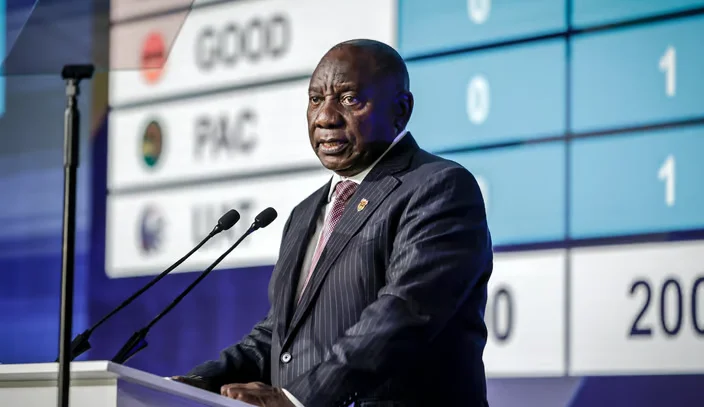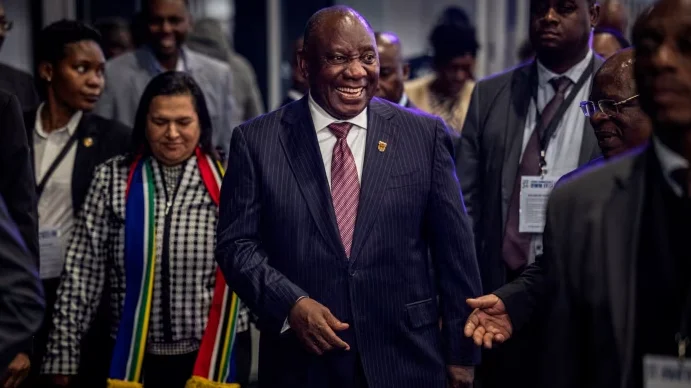
South African President Cyril Ramaphosa addresses the results of the general election at the IEC National Results Center, Midrand, June 2, 2024. The ANC lost its 30-year majority, securing only 159 of 400 parliamentary seats. Photo | Topnews
In Summary:
- ANC loses majority after 30 years in power.
- Diverse potential coalition partners make negotiations challenging.
South Africa is closely watching the African National Congress (ANC) as it deliberates on a coalition partner after losing its majority for the first time in 30 years of democracy.
The ANC, which has dominated since the end of apartheid in 1994, secured only 40.2% of the vote, a sharp decline from 57.5% five years ago.
Voter dissatisfaction with unemployment, inequality, and persistent power blackouts significantly impacted the results.
Despite being the largest party, the ANC must now form a coalition to govern.
President Cyril Ramaphosa emphasized the need for “responsible leadership and constructive engagement” in his weekly newsletter.
The ANC’s potential coalition partners are ideologically diverse, ranging from the pro-business Democratic Alliance (DA) to the Marxist Economic Freedom Fighters (EFF), presenting a complex negotiation landscape.
ANC secretary-general Fikile Mbalula expressed the party’s willingness to collaborate, stating, “We would work with anyone who wants to work with us but not with a cap in the hand.”

President Cyril Ramaphosa remarked after the election results, “Our citizens expect all parties to collaborate within the bounds of our constitution.” IMAGE / Getty Images
A 27-member ANC committee is scheduled to meet on Tuesday to prepare options for the National Executive Committee’s review on Wednesday.
The DA and the Inkatha Freedom Party (IFP) have already formed negotiating teams.
The DA received 21.8% of the vote, MK (uMkhonto we Sizwe) 14.6%, the EFF 9.5%, and the IFP 3.9%.
The electorate’s message was clear, according to IFP leader Velenkosini Hlabisa, who said, “The people of South Africa spoke loud and clear that political parties must find each other and constitute a government on their behalf.”
Under the constitution, the newly elected parliament must convene within two weeks to elect the next president. While Ramaphosa remains publicly supported by ANC officials, he may face challenges during coalition talks from within and outside the party.
Zwelinzima Ndevu from Stellenbosch University and political analyst Ralph Mathekga foresee difficult negotiations, particularly regarding the ANC’s anti-corruption stance, which the DA is likely to push hard.
Despite potential obstacles, some analysts, like Susan Booysen, see a possible ANC-DA coalition, citing the DA’s effective provincial governance.
Financial markets, favoring the DA’s pro-business policies, showed some optimism. However, alternative outcomes such as a national unity government or a minority ANC government supported on key votes remain possible.
The new MK party, led by former president Jacob Zuma, adds another variable, though an ANC-MK coalition is deemed unlikely due to historical and ongoing tensions.
MK is considering a court challenge to the election results, with concerns of unrest if Zuma’s supporters contest the outcome.
